Rooms
The latest Rooms breaking news, comment, reviews and features from the experts at Realhomes
Explore Rooms
-

The top kitchen color trends of 2024 that interior designers are seeing everywhere — 7 lush hues to try
Looking for kitchen color trends for 2024? We've asked interior designers what's big this year and what they're currently loving
By Eve Smallman Last updated
-

Small en suite bathroom ideas - 10 stylish solutions for a compact space
From inbuilt storage to clever design tricks, there are plenty of ways to make a small en suite bathroom both a design destination and a function space
By Isabella Charlesworth Published
-

7 rustic kitchen ideas that bring back timeless charm to the heart of your home
Rediscover the warmth of rustic kitchen design. Our experts share their top tips for bringing this charming style back to life
By Isabella Charlesworth Published
-

Charli XCX's living room combines "contemporary and vintage-inspired" pieces, according to designers — see how to get the look
Interior designers are loving Charli XCX's living room, balancing vintage-inspired furniture with modern colors and aesthetics
By Emily Lambe Last updated
-

I found the weighted blanket Olivia Rodrigo can't live without — and 3 budget alternatives
We tracked down the weighted blanket Olivia Rodrigo can't live without, plus 3 budget alternatives. See our top picks for your most relaxing sleep ever
By Emily Lambe Last updated
-

Hailey Bieber's Rhode office is "super chic and minimal" according to design pros
Hailey Bieber's Rhode office serves as great inspiration if you're redoing your WFH set-up. See what design pros think of this sleek and neutral space
By Emily Lambe Last updated
-

7 breakfast nook ideas for a relaxing start to the day
We share our top breakfast nook ideas that will add a great addition to your kitchen and kickstart your morning
By Isabella Charlesworth Published
-

Alicia Silverstone’s kitchen is a masterclass in nostalgiacore — designers adore its “simplicity and coziness”
The Clueless star's space plays with vintage-style touches brilliantly
By Eve Smallman Published
-

Eva Longoria’s dining room perfectly “balances comfort and drama,” according to interior designers
Experts are swooning over the actor’s chic and timeless style
By Eve Smallman Published
-

8 pink living room ideas – liven up your space with this joyful color
Our pink living room ideas will give you all the feels, from pale blush to neon brights, we've got you covered
By Sophie Warren-Smith Published
-

Olivia Rodrigo’s living room feels “relaxed and livable” — designers rate her stylish color choices
The singer's space shows off her youthful and vibrant personality
By Eve Smallman Published
-
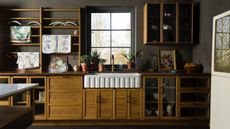
9 brown kitchen cabinet ideas that will introduce you to this versatile color
Delve into our brown kitchen cabinet ideas and you'll fall in love with this elegant scheme
By Sophie Warren-Smith Published
-
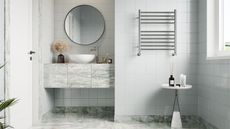
A gray and white bathroom might not sound inspiring, but this classic pairing is anything but boring
By Isabella Charlesworth Published
-

Kitchen cabinet lighting: 8 ideas for a beautifully illuminated space
A cozy and ambient kitchen has to consider lighting. Here are some cabinet lighting ideas to spark your imagination
By Becca Cullum-Green Published
-

Blue and gray bathroom ideas- 6 designs to inspire a cool new look
Our blue and gray bathroom ideas inspire you to pair up and put a fresh new twist on these classic bathroom colors
By Isabella Charlesworth Published
-

8 cozy kitchen ideas - how to make your space feel warm and inviting
Design your cozy kitchen with these expert-approved tips. See decor ideas and how to style your space
By Becca Cullum-Green Published
-

Chrishell Stause's entryway is chic yet cozy — designers say it’s “perfect for creating a stylish first impression”
Interior designers love the Selling Sunset star's glam space
By Eve Smallman Published
-

Say hello to fridgescaping — the kitchen trend that will “romanticize your life”
Everything you need to know about the decor trend that's taking over Instagram and TikTok
By Eve Smallman Published
-

Dakota Fanning's living room is “as stylish as it is comfortable” and brings in a huge 2024 design trend
The Watchers star has created a cozy space that's chic, natural, and full of surprises
By Eve Smallman Published
-

We asked the experts why Kylie Kelce’s kitchen design works so well – here's what they said
Step inside Kylie Kelce's kitchen for a look at how the star has decorated her space. Plus, see why design experts are loving this set-up
By Ellis Cochrane Published
-
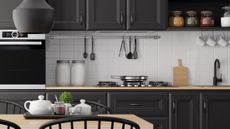
9 bold and unapologetic black kitchen cabinet ideas
Dare to go dark and choose black as your dominant color for your next kitchen project. See our design ideas, as approved by interiors experts
By Becca Cullum-Green Published
-

Jennifer Garner just made cooking on-the-go look easy with these outdoor cooking appliances
See the cooking appliances Jennifer Garner uses while camping outdoors. See how to make everything from smoothies to hashbrowns
By Ellis Cochrane Published
-
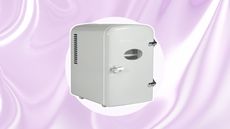
This countertop mini fridge from Amazon is perfect for dorm dwellers and so on-trend
Keep your snacks fresh with this cooling cutie
By Eve Smallman Published
-

Hailey Bieber's kitchen is “the epitome of California cool” according to interior designers
The model and influencer has a cooking space that's chic and inviting
By Eve Smallman Published
-

White kitchen cabinet ideas - 8 stylish ways to embrace a light-colored kitchen
Is your heart set on a bright white kitchen? Here are some ideas to inspire you
By Becca Cullum-Green Published
-

Fall bathroom decor ideas — 5 sweet ways to bring in seasonal touches
Bring the cozy season into your wash space with these clever tips and tricks
By Eve Smallman Published
-
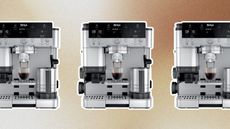
Ninja has just released its first barista-style coffee machine – here’s everything you need to know
Discover everything you need to know about the Ninja Luxe Cafe espresso machine. This brand-new launch combines three machines into one
By Ellis Cochrane Published
-

5 fall kitchen decor ideas that are perfect for adding coziness to your cooking space
Warm colors, seasonal vignettes, fresh foliage, and more
By Eve Smallman Published
-

10 black kitchen countertop ideas to add a luxe look
From granite to marble and peel and stick, our black kitchen countertop ideas will enhance your space
By Sophie Warren-Smith Published
